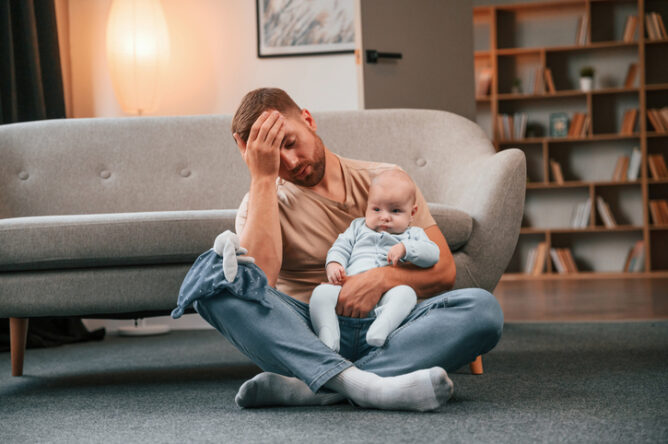Sometimes you just feel off—heavy, drained, unmotivated—and it’s easy to jump to the worst conclusion.

Am I depressed? Is something seriously wrong with me? Of course, not every tough stretch points to clinical depression. Sometimes, your mind is just plain exhausted. Here are some signs you might be mentally worn out rather than dealing with deeper depression, and why recognising the difference matters. And just for the record, if you’re struggling either way, talk to someone you trust about how you’re feeling. If you’d rather speak to someone anonymously, Samaritans is available 24/7 at 116 123.
1. You feel emotionally flat but still react to important things.

When you’re mentally exhausted, you might feel numb or detached a lot of the time. However, if something genuinely meaningful happens, good or bad, you can still tap into emotion, even if it feels dulled. With clinical depression, even major life events often don’t spark much reaction. Mental exhaustion blunts feelings, but it doesn’t totally sever your emotional connection to your life.
2. Rest and breaks actually help a little.

If taking a weekend off, getting extra sleep, or unplugging from responsibility makes you feel even slightly more human, that’s a good clue you’re dealing with exhaustion, not full-on depression. Clinical depression doesn’t lift with rest; it lingers no matter how many breaks you take. Mental fatigue, though, sometimes eases a little when you actually give yourself permission to slow down.
3. You still care—you just don’t have the energy to show it.

You want to reply to texts, check in on friends, work on your goals, but the thought of doing any of it feels exhausting. It’s not that you don’t care; it’s that your brain is waving a tiny white flag begging for a timeout. Depression often steals the feeling of caring itself. With exhaustion, the care is still there; you just feel too spent to act on it right now.
4. You’re overwhelmed by simple decisions.

Choosing what to eat, what to wear, what show to watch—it all feels harder than it should. Mental exhaustion makes even tiny choices feel like huge, energy-draining tasks. While decision fatigue can happen with depression too, if it’s mostly tied to being overwhelmed and tends to lift once you’re less stressed, that’s a strong sign your brain is just overtired, not broken.
5. You fantasise about escaping, not disappearing.

When you’re mentally exhausted, you might daydream about running away to a cabin in the woods or booking a one-way flight to somewhere quiet. It’s about wanting peace, not about wanting to stop existing altogether. Feeling like you need a break from life’s demands is different from the deep hopelessness that often comes with clinical depression. One is about needing recovery; the other is about struggling to see any future at all.
6. You can still enjoy small moments if you catch them.

Maybe a funny meme makes you laugh. Maybe a sunset catches your eye. Even when you’re exhausted, you’re still capable of feeling little flickers of joy when you slow down enough to notice them. With deep depression, even good things often feel muted, irrelevant, or inaccessible. Mental exhaustion makes it harder to access joy, but not impossible.
7. Your mood improves after a good conversation.

When you’re mentally tired, talking with someone who gets you—someone who listens and makes you feel seen—can lift your mood, even if just for a while. You leave the conversation feeling a little lighter, not heavier. Depression, on the other hand, often makes connection feel draining or pointless. If good company still soothes you sometimes, it’s a sign your heart’s still reachable; you’re just deeply tired.
8. You’re more irritable than sad.

Mental exhaustion often shows up as a short fuse: snapping at small things, feeling impatient, or getting annoyed way more easily than usual. You’re on edge because your internal battery is flashing red, not because you’re sinking into despair. While depression can involve anger too, it’s usually wrapped up in deeper hopelessness and self-criticism. Exhaustion tends to make you more cranky and overstimulated than anything else.
9. Physical symptoms get worse when you’re stressed.

Headaches, tight shoulders, digestive issues—they all tend to flare up when you’re pushing yourself too hard for too long. Your body keeps the score when your mind is overloaded. If you notice these symptoms easing when you rest, slow down, or lower your stress, it’s a strong clue that your exhaustion is the culprit, not an underlying mental health disorder.
10. Motivation comes back in waves.

With mental exhaustion, there are still moments where energy bubbles up—a sudden urge to clean, call a friend, or work on a hobby. The problem is keeping that momentum going, not finding it in the first place. In clinical depression, even short bursts of motivation can be painfully rare. If you’re still catching little sparks here and there, that’s your mind’s way of telling you it’s tired, not broken.
11. You dread obligations, but not everything.

You might dread work emails, errands, deadlines, but you still look forward to some things, even if it’s just a new show dropping or a cosy night in. That thread of excitement, however thin, still exists. With depression, it’s common for even fun or relaxing things to feel hollow. If you’re exhausted, you might hate the grind, but you can still crave comfort and small pleasures.
12. Your inner critic is louder when you’re tired.

When you’re drained, your brain gets meaner. You might beat yourself up for being “lazy” or “bad at adulting” when really, you’re just running on fumes. Exhaustion distorts how you see yourself, but it doesn’t mean the critical voice is telling the truth. If you notice your self-talk improving even a little after rest or support, it’s a sign you’re not fundamentally broken, just depleted and in need of serious kindness (especially from yourself).
13. You have a clear sense of what you miss.

You might daydream about feeling energetic again, being social again, finding joy in your hobbies again. The fact that you miss those things, and can picture yourself wanting them, points to exhaustion, not complete emotional disconnection. In depression, imagining a future where you feel better often feels impossible. Longing for a version of yourself that feels more alive is actually a hopeful sign, even if it doesn’t feel like it right now.
14. Rest feels like relief, not emptiness.

When you finally get a break, even a small one, and feel some sense of relief wash over you, it’s your body’s way of saying thank you. Exhaustion responds to being cared for. Depression often leaves you feeling flat no matter how much you rest. If real rest brings even a sliver of lightness, it’s a powerful sign that you’re exhausted, not lost. And what you need isn’t to toughen up—it’s to slow down, soften, and give yourself permission to heal without guilt.




